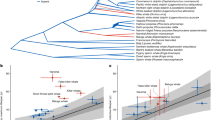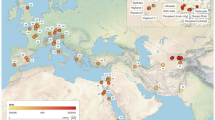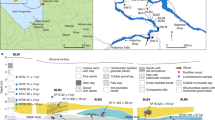Abstract
AN abnormal wool, more apparent on older sheep and known as ‘doggy’ wool, is a cause of considerable financial loss in some Merino and Polwarth flocks. Such wool is frequently lustrous and is characterized by reduced frequency of crimps, so that in extreme cases the fibres are almost straight and hair-like. Preliminary evidence is presented here that doggy wool is associated with hyperplasia and cyst formation of the outer root-sheaths of a considerable proportion of the follicle population of affected sheep.
This is a preview of subscription content, access via your institution
Access options
Subscribe to this journal
Receive 51 print issues and online access
$199.00 per year
only $3.90 per issue
Buy this article
- Purchase on Springer Link
- Instant access to full article PDF
Prices may be subject to local taxes which are calculated during checkout
Similar content being viewed by others
References
Ryder, M. L., and Auber, L., Nature, 174, 743 (1954).
Ryder, M. L., J. Agric. Sci., 47, 187 (1956).
Author information
Authors and Affiliations
Rights and permissions
About this article
Cite this article
CHAPMAN, R., SHORT, B. & HYLAND, P. Abnormal Crimping in Merino and Polwarth Wools. Nature 187, 960–961 (1960). https://doi.org/10.1038/187960a0
Issue Date:
DOI: https://doi.org/10.1038/187960a0
Comments
By submitting a comment you agree to abide by our Terms and Community Guidelines. If you find something abusive or that does not comply with our terms or guidelines please flag it as inappropriate.



